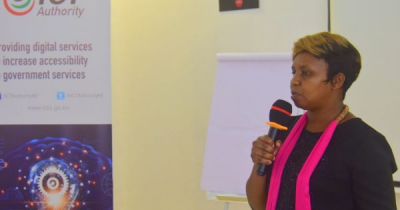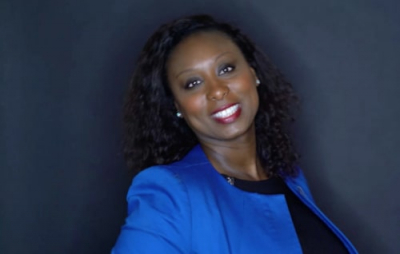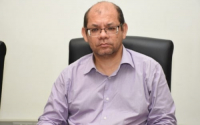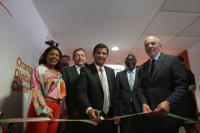The startup, which took advantage of the slowdown of cultural and sports activities during the Covid-19 crisis, has improved its services. Now, it seeks more users.
The first fully-Moroccan smart ticketing platform Guichet.com, with more than 1,000 events and shows organized in collaboration with various partners, also plans to conquer other high-potential markets on the continent.
Guichet Maroc SARL, the startup behind Guichet.com, secured last Friday, March 11, a $309,000 (3 million dirhams) financing from CDG Invest, the investment arm of the CDG group. The startup, which was founded in 2009 by Ahmed Tawfik Moulnakhla (pictured), said it will use the money to consolidate Guichet.com’s operations in Morocco, extend to the sports industry, and conquer new high-potential markets in Africa.
Guichet.com is an intermediation platform between the public and event promoters (plays, soccer matches, music concerts, festivals, training courses, etc.). It provides them with tickets and digital tickets which can be paid for online. It's quite a useful app, especially for people who are not fond of waiting in line when going to see movies. The platform also provides partners with an autonomous management and steering environment with real-time ticketing monitoring.
The platform has tens of thousands of users, has covered over 1,000 events and shows, in partnership with several exclusive partners like the Mawazine Festival, the Marrakech Laughing Festival, the Fez Festival of World Sacred Music, and the Oasis Festival.
In 2021, new features were added to Guichet.com. These include an option to purchase packages including accommodation, catering, and ancillary products for an event; there is also a store where partners can sell their products. The app is available on PlayStore and AppleStore.
Ruben Tchounyabe
People living in Africa, especially in rural areas, continue to face challenges in accessing energy and internet connectivity. This situation is a major barrier to the development of e-learning across the continent. Despite the various solutions developed to address the issue, a lot still needs to be done.
In 2020, Covid-19 affected education in several African countries. For several months, schools were closed and e-learning was the only way out. Unfortunately, the alternative distance learning solutions set up by the states were not always effective. To help governments in this strategy, Franco-Togolese Victor Agbegnenou (pictured) has developed an e-learning solution, Retice Renal Smart 80/20. The latter is a combination of digital tools, including a platform for management and synchronized exchanges with tablets and educational software, and offline infrastructure. It allows teachers to interact with each student via a connected tablet equipped with digitized textbooks and to deliver their lessons in person or remotely. Connectivity is provided by "PWCS" technology, a point-to-multipoint wireless communication system.
Lebon Ngounou, Managing Director of Retice Africa Sarl, believes that with this technology, students and teachers can stay at home and still attend class. The solution is adapted to rural areas and embeds energy storage units rechargeable with a solar lamp. Retice Renal Smart 80/20 received the 2018 ITBP Sorbonne Award and was recognized by Unesco and the International Organization of the Francophonie as a digital solution for education. It is also listed as one of the Top 40 digital technologies for education certified by the African Union in 2019.
KA Technologies, the company created by Victor Agbegnenou to deploy the solution, has been working to equip nearly 150,000 students in Togo since 2020. The solution is already deployed in Senegal in two municipalities and Nigeria in the state of Kano. The company has already obtained the formal agreement of the Ministry of Basic Education and the Ministry of Posts and Telecommunications of Cameroon. Talks are ongoing for an upcoming launch in the country.
Ruben Tchounyabe
In 2008, The Kenyan government started deploying a development vision that runs until 2030. Digital technology, a part of this vision, hadn’t attracted much interest in the past but the narrative has changed now.
Kenya's Ministry of Information and Communication Technology, Youth and Innovation has announced the elaboration of a national digital master plan. The 10-year plan, which was the focus of a validation workshop held last Friday, aims to advance Kenya’s socio-economic development by leveraging technology.
The strategy focuses on the following areas: digital infrastructure, digital services, and data management, digital skills, digital innovation, and digital business. It should help the country create wealth and jobs, in line with its 2030 Vision adopted on June 10, 2008.
Lucy Mulili (picture), Administrative Secretary at the Ministry of ICT, representing the Cabinet Secretary for ICT, Joe Mucheru, explained that “the document draws heavily on the 2019 National ICT Policy, which explains how ICT as a foundation creates a robust economy and thus improves the lives of Kenyans.”
The Kenyan government's strategic actions under the National Digital Master Plan reflect a commitment to advancing digitalization which the World Bank sees as an asset for development–and clearly demonstrated by Covid-19.
Under the new plan, Nairobi is set to, among others, lay 100,000 km of fiber optic cable–52,000 km for the government and 48,000 km for private companies– to provide reliable and affordable connectivity for all. It also plans to provide 1.2 million laptops to schools, train 350,000 teachers in the use of technology, and connect 40,000 schools to a sustainable Internet network. The plan should cost Sh5 billion ($43.7 million) to implement.
Adoni Conrad Quenum
Less than two months after raising $10 million, mobility fintech Moove Africa secured additional resources to fund its expansion on and off the continent.
Moove Africa, a Nigerian-created fintech company that makes it easier for African entrepreneurs to access financing for new vehicle purchases, announced on Monday, March 14, that it raised $105 million in equity and debt in a Series A2 financing. The deal brings to $174.5 million the total funds raised to date by the company founded in 2019 by Nigerian-born Britons Ladi Delano and Jide Odunsi.
“Less than two years ago, we discovered this white space of mobility fintech and launched Moove. After surpassing 3 million trips in Moove-funded vehicles across Africa, rolling out our service in six new African cities, and connecting mobility entrepreneurs to the ride-sharing, e-logistics, and delivery markets, we are now leading this growing Fintech sector... We are thrilled to have the support of investors around the world who will help us take our model to the world,” commented Ladi Delano.
This new fundraising comes less than two months after Moove Africa obtained a $10 million financing facility from UAE-based investment firm NBK Capital Partners. The money, raised on 1 February 2022, was aimed at supporting the West African expansion of Uber's exclusive partner for vehicle financing and provisioning in sub-Saharan Africa.
The mobility fintech plans, over the next six months, to continue its expansion into seven new markets in Asia, Europe, the Middle East and North Africa (MENA) region. The company, which is present in six African cities, also intends to build new partnerships while expanding its range of vehicles.
In Africa, less than 5% of all new vehicles are purchased with a loan compared to 92% in Europe, Moove Africa complains. On the continent, the vehicle ownership rate is below 44 cars per 1,000 people, compared to 640 per 1,000 in Europe and 816 in the United States, the mobility fintech continues. According to the company, Africa’s low ownership is due to a low penetration rate of borrowing, which it believes has limited the ability of more than 1 billion Africans on the continent to purchase new vehicles. According to Ladi Delano, millions of entrepreneurs in emerging markets have limited or no access to vehicle financing, even though the market opportunity is vast. The two-wheeler rental market is estimated at $80 billion in sub-Saharan Africa, according to data provided by Moove. Yet the continent recorded fewer than 900,000 new vehicle sales in 2019, compared to 17 million in the United States.
Chamberline MOKO
Born in Senegal, Karima-Catherine Goundiam (pictured), also of Moroccan descent, grew up and studied in France and the United States before moving to Canada in 2000, according to information relayed by ONFR+. Until 2014, she worked for large companies, including the audit and consulting firm Deloitte. She then ventured into entrepreneurship in 2015 and founded Red Dot Digital. With her company, Karima-Catherine Goundiam seeks to put digital networking at the heart of business transformation and help companies build a strong digital strategy.
Her biggest accomplishment is a global digital business matchmaking platform called B2BeeMatch. Launched in 2019, this solution made its real debut in Europe in 2020 during Covid-19. “I remember presenting this project in Europe in January 2020. The response was quite cold and perplexed: nobody saw the advantage of going digital since we could see each other physically. A matchmaking application did not seem to be an immediate need," she says.
As the pandemic acted as an accelerator of digital transformation within companies, B2BeeMatch quickly became an indispensable tool. In only one year, the platform grew rapidly and, in January 2021, it became bilingual, which allowed it to integrate the Francophone community and to develop partnerships, such as the International Chamber of Commerce, and the Fédération des gens d'affaires francophones de l'Ontario (FGA).
Beyond her entrepreneurial activity, Karima-Catherine Goundiam is the vice-president of the British Canadian Chamber of Commerce. She also intends to broaden her understanding of the business world, she says, by participating in numerous tech conferences. Also, she teaches at European universities and advises Canadians on technology and management. Through her multiple actions, she wants to inspire the young generation, especially on the importance of diversity in tech.
While access to business opportunities and financing is still a challenge for black entrepreneurs, Karima-Catherine Goundiam admits that being a black francophone businesswoman has been an asset. Her uniqueness makes it easier to be remembered. "I was able to turn everything that could make me statistically an underachiever into an asset, to be a person who struggles to be even more successful. I don't take no for an answer. I'm resilient enough to go into a market where no one expects me to," she adds.
B2BeeMatch is based on a particular approach, which eliminates biases, blind spots, perceptions, and all those prejudices that block the focus on skills, diversity, and innovation. On the platform, it is possible to find future business partners, subcontractors, clients, and even funds. Based in Toronto, the platform is already present in over 45 countries. Comforted by this success, the entrepreneur announced she is launching a second version of the platform in early March.
Aïsha Moyouzame
The digital is bringing fish farmers the opportunities to improve their business and profit. It also allows them to own an essential part of the value chain.
When Dave Okech (pictured, left) started fish farming in Kenya in 2016, he immediately noticed the problems plaguing the sector, including low productivity and lack of technical assistance. Interested in technology, he develops digital tools to help address these obstacles.
He then created AquaRech in 2018. The solution is a package made of a mobile app, a connected thermometer, and a web platform. The mobile app incorporates a centralized database system that connects fish farmers, fish traders, and feed suppliers. It is available on Android and allows users to calculate the amount of feed needed by the fish population based on the water temperature. This data is collected via the connected thermometer installed in the fish breeding tank. Having an idea of the amount of food needed by their fish, farmers can directly contact producers via the web platform without going through intermediaries which made the process tedious.
Using Dave Okech's solution allows fish farmers to reduce the production period from 13 to 8 months, increase yields, reduce production costs by 30% and increase profits by 25%. The promoter has received numerous awards for his many efforts in the fish farming industry in Kenya. These include the Mandela Washington Fellow 2016, the Acumen Fellow 2019, and the Global Farmer Network Fellow 2020.
Adoni Conrad Quenum
The 1st Miss Geek in the history of Senegal and 2nd Miss Geek Africa 2018, she proved to be a very talented young woman. She currently holds a management position in a research institute on agricultural and rural policies and intends to train other young women in ICT.
Ndeye Fatou Mboup (pictured) is interested in disruptive technologies such as artificial intelligence, IoT, and blockchain. She is the current innovation and ICT project/program manager at IPAR (Initiative de prospective agricole et rurale) and is specialized in creating digital solutions based on the SDGs. The serial entrepreneur, as she describes herself, is the CEO of TSG Tech and the co-founder of the startup E-Wanacc.
Ndeye Fatou Mboup has participated in training in Senegal, Rwanda, Spain, Uganda, Germany, and Egypt, as part of the digital entrepreneurship program AFRIMAC or Disrupt BootCamp organized by the YES (Young Entrepreneur School) of Nice-France. A member of FESTIC (Association of Senegalese Women in ICT) or Enablis (Network of SME entrepreneurs in Senegal), where she was a consultant, she has won many national and international competitions since 2017.
Winner of the Challenge of the 1000 entrepreneurs of Africa of the 2020 Africa-France/Sustainable City Summit, Ndeye Fatou Mboup also won the national competition for the World Summit on the Information Society (WSIS), organized by the Ministry of Telecommunications and Digital Economy. She was also elected the first-ever Miss Geek Senegal in 2018 and recently won a bronze medal at the Challenge Innovation Forum in Qatar in November 2021.
Her remarkable career has earned her congratulations from the highest levels of the State. "Warm congratulations to our young compatriot Ndeye Fatou Mboup, from Initiative prospective agricole et rurale, for her bronze medal at the Challenge Innovation Forum in Qatar. I also congratulate the Institut Supérieur de Management of which the winner is a graduate," President Macky Sall tweeted.
Ndeye Fatou Mboup aims to represent women leadership around the world and is committed to working for the professional development of girls and women in ICT.
Aïsha Moyouzame
In the past decade, Mauritius has invested heavily in ICT to create a digital economy as announced in 2010. This has helped the country better cope with the economic crisis induced by Covid-19.
The Mauritian government has decided to leverage its digital assets to boost tourism, whose contribution to the country’s GDP plunged by 62.1% in 2020 due to Covid-19. From 19.5% of the GDP and $2.4 billion of revenues in 2019, the sector tumbled to 8.7% and $945.5 million in 2020.
Now, the Island no longer focuses on using the Internet and the web for tourism promotion; rather, it wants to build a robust digital environment to attract location-independent workers.
Last month, Nilen Vencadasmy (photo), chairman of the Mauritius Tourism Promotion Authority, started touring some African countries to sell this new vision. On 26th February, he was in South Africa which is considered an important market; 130,000 South Africans visited Mauritius in 2019.
The Premium Travel Visa is the first digital asset that Mauritius will use to achieve its new ambitions. Launched on November 16, 2020, this one-year renewable residence permit granted to non-Mauritian nationals is accessible online. The Mauritius Economic Development Committee specifies that applicants for this permit must meet several criteria, including not being involved in the Mauritian labor market, proving that the main place of business and the source of income and profits are outside Mauritius.
Mauritius' other digital assets are grouped into a digital ecosystem conducive to remote work. The country ranked 8th in Africa for average mobile Internet speed in January 2022 with 20.59 megabits per second (Mbps), as well as 7th in Africa for average fixed Internet speed with 19.88 Mbps, according to Speedtest Global Index.
As for the cost of the Internet, Cable.co.uk, in its report "Worldwide mobile data pricing 2021. The cost of 1GB of mobile data in 230 countries," ranks Mauritius 5th in sub-Saharan Africa for the average cost of accessing 1 Gigabit (GB): $0.75. The Portulans Institute and STL's Network Readiness Index 2021 rank the country among the best in Africa in terms of Internet coverage. In the International Telecommunication Union's (ITU) Global Cybersecurity Index 2020, Mauritius ranks first in the level of security of its information systems since 2014.
By targeting digital nomads, Mauritius, which plans to "relax the entry protocol in the coming weeks," according to Nilen Vencadasmy, hopes to once more make tourism a strong contributor to GDP, not only by ensuring that the industry regains its previous dynamism but also by attracting quality visitors.
Muriel Edjo
The government of Seychelles announced it is now connected to a second undersea optical fiber system that will boost access to connectivity in the country. The Pakistan East Africa Cable Express (PEACE) system landed on the Perseverance Island, a man-made island northeast of Mahé, the country's largest island, on Monday, March 7.
Benjamin Choppy (pictured), the Principal Secretary of the ICT Ministry, sees this infrastructure as an opportunity for the country to secure and improve its means of communication. Since 2011, Seychelles has been connected to a single undersea optical fiber cable, the Seychelles East Africa System (SEAS), which links it to Tanzania.
“For over 10 years, we had only one and this presented a risk for us if anything happens, especially today. If you look at the amount of traffic that we have on the cable, over 95 percent is on the SEAS cable. If something went wrong it would be catastrophic,” said Benjamin Choppy.
The PEACE is a 15,000 km undersea cable system spanning Africa, Europe, and Asia. It incorporates the latest 200G and WSS technology in its design to transmit more than 16 terabits of data per second per fiber pair. These capabilities give it the means to meet the growing connectivity needs in the country.
The Seychelles government has invested $20 million to connect to this new high-speed telecom infrastructure that will support the digitization of public services and the development of the digital economy. Amadou Dina, managing director of Airtel Seychelles, said the telecom company has already designed new products that will be launched when the new system goes live next May.
Adoni Conrad Quenum
Since 2019, the telco has been deploying measures to strengthen its footprint on its markets in the MENA region. Last March 10, Madagascar officially became the ninth country in Africa and the Middle East to join the Orange telecom group's digital training and innovation support network. The company inaugurated its "Orange Digital Center" in Antananarivo, in the Redland Tower in Ankorondrano.
This is an ecosystem entirely implemented with the German cooperation and dedicated to the development of digital skills and support for innovative project leaders. It has been operational since October 19, 2021.
According to Alioune Ndiaye, President, and CEO of Orange Africa and the Middle East, Orange Digital Center Madagascar "is part of the network of 32 Orange Digital Centers of the Orange Group, which will be deployed in all our markets in Africa and the Middle East, but also in Europe. The aim is to democratize access to digital technology for young people, both graduates, and non-graduates, to give them access to the latest technological skills to enhance their employability, and to prepare them for the jobs of tomorrow.”
The site covers 800 m2 and includes a Coding School, a digital manufacturing workshop, FabLab Solidaire, run by the Orange Foundation and located at the University of Antananarivo, and an Orange Fab startup accelerator, supported by Orange Ventures, the Orange Group's investment fund. All training and coaching programs are free and open to all. The collaboration between Orange and the German Cooperation in Madagascar is part of the development partnership of the "develoPPP program" developed on behalf of the German Federal Ministry for Economic Cooperation and Development (BMZ). The objective is to achieve a common vision, which is to promote youth employability and access to ICT jobs for women and girls while supporting sustainable growth and digital transformation.
To contribute to the access of an even greater number of young people to digital-related knowledge, two Orange Digital Center Clubs, extensions of the Coding school, are also planned to be set up at the University of Fianarantsoa and the University of Antsiranana.
Muriel Edjo
More...
Digital transformation has accelerated across Africa in recent years, driven by Covid-19. Several countries have taken action to avoid missing the next global revolution.
The Ivorian government announced it has taken steps to make the Internet accessible across the territory. Under this plan, the government launched last March 7 in Abidjan the study on the universality of the Internet. The ceremony was presided over by the Minister of Digital Economy, Telecoms and Innovation, Roger Adom (pictured).
This study, initiated by the United Nations Educational, Scientific and Cultural Organization (UNESCO), through the UNESCO Chair, will be conducted with the monitoring of an advisory committee of the digital sector. "After making consensual findings, we will make recommendations to improve the Internet in Côte d'Ivoire," said Professor Alain Kiyindou, Representative of the Unesco Chair. He said an official validation ceremony for the study is planned between May and June 2022 before the results are presented in December 2022 in Addis Ababa at the Internet Governance Forum (IGF).
According to the ICT Regulatory Authority of Côte d'Ivoire (ARTCI), the Internet penetration rate was about 78% in Q3 2021. It is calculated by comparing the number of Internet subscriptions to the total population. ARTCI says this rate may not reflect the true level of Internet access in the country because many individuals in urban areas hold multiple SIM cards, which increases the number of subscriptions. In their Digital Report 2022, We Are Social and Hootsuite estimate Internet penetration in Côte d'Ivoire at 36.3%.
The study on the universality of the Internet in Côte d'Ivoire is financed up to CFA13.250 million ($22.3 million) by the Economic Community of West African States (ECOWAS) Investment and Development Bank. Its benefits should enable Ivorians to benefit from the $180 billion in revenue that the digital economy is expected to generate in Africa by 2025, according to Google and the International Finance Corporation (IFC).
Muriel Edjo
They were chosen among the eight candidates from the continent who were shortlisted in February. Their projects were judged to be in line with the major challenges facing society.
A Gabonese, an Ivorian, a Ugandan, and a South African won the 10th edition of Les Margaret Awards. Ariane Akeret Soufiano, Cleo Ngokoudi, Malebina Tsotsotso and Shamim Nabuuma Kaliisa, were declared winners last March 8.
Ariane Akeret won with her project CaPay in the category Entrepreneur Africa. CaPay is an application designed to facilitate the payment of salaries and other financial transactions via mobile money in Gabon. It is a digital platform offered to employees, retirees and other unbanked populations of companies, social benefit funds, organizations, associations and public administrations.
Cleo Ngokoudi won the Intrapreneur Africa category with Anka, a platform that provides Ivorian merchants with integrated digital management solutions, facilitating international financial transactions. She is the CFO of the company.
Malebina Tsotsotso is 15 years old. She won in the Junior Africa category with MTutor, an e-learning platform designed to provide an adaptable, scalable, safe and secure edtech tool in South Africa.
Shamim Nabuuma Kaliisa received the Jury's Hope Award. She is the founder of Chil AI Lab, a startup that uses artificial intelligence and machine learning to extend essential health services to poor and marginalized women in Uganda.
According to Delphine Remy-Boutang, president and CEO of The Bureau and JFD, which organizes the award, each winner's project was the best of hundreds. "We received more than 300 applications," she said in February. The winners will benefit from JFD's Growth Acceleration Program for one year. This includes media exposure worth €1 million, mentoring and coaching in collaboration with JFD partners.
The Margaret Junior will benefit from JFD's growth acceleration program - to develop her entrepreneurial project, a scholarship and digital participation in the ARTEMIS I mission, the first preparatory flight for the return of humans to the Moon. The Jury's Hope Prize was offered an original work by artist Caroline Corbasson, specially designed for the JFD.
Muriel Edjo
The Cameroonian video game studio Kiro'o Games announced it will seek new investors, tomorrow March 10. To this end, the startup has issued an invitation for a Zoom meeting at 8 pm Yaoundé time, during which Founder and CEO Olivier Madiba (pictured) will present the company's business plan and expected results. He will also discuss with potential new shareholders the risks and return on investment.
Kiro'o Games, which launched its first products in 2013, claims to have raised $530,000 through Equity Crowdfunding to date. The funds have enabled it to bring new products to market and record more than 150,000 downloads of its products. Given the growing interest of African gamers in local games, the startup wants to grow quickly to take advantage of the potential multi-billion dollar industry.
"At Kiro'o Games we have been preparing since 2017 for this multi-billion dollar opportunity that the African mobile game market represents. That's why in 2019 we opened our capital to raise $1 million," explains Olivier Madiba.
The new capital raising that the Cameroonian startup is preparing comes a few days after it formed the Pan African Gaming Group (PAGG) alongside 9 other African video game studios. The African video game industry is expected to reach 680 million people by 2025.
Kiro'o Games relies on the credibility acquired in Cameroon and Central Africa over the past few years to convince new investors. This credibility has earned the company several awards from Games Industry Africa in several categories, including Innovation of the Year, Team of the Year, Mobile Game with the most impact, and Debut of the Year.
Muriel Edjo
With 12,000 readers using his online bookshop, Vincent Milewa wants to transmit his love of reading to his fellow Kenyans. As his startup RafuBooks grows, he wants to attract more customers in other East African countries.
Growing up in a poor family, Vincent Milewa (pictured) used books as a roadmap to escape poverty. In school, he became fascinated with personal development and business. Later, he trained in computer science and worked in the telecom industry for more than ten years in sales and marketing. While going through a difficult phase in 2018, he dived back into reading but found it difficult to get the books he wanted. The idea came to him to create a library. That's how RafuBooks was born.
To make his project a reality, Vincent Milewa invested half of his monthly salary and received support from his family and friends. He was also able to secure some funding from an investment group of which he was a part. The resources collected allowed him to start his project in an office space with some books, a website, and three employees.
“I went through a tough phase in 2018 and read a lot. At some point, I was reading two to three books a week but obtaining them was a challenge and I hated going to town to shop. I had always wanted to start an e-commerce platform. At first, I had a small selection of books with the primary goal of fast, same-day delivery in Nairobi. People can order at 3 pm and still get it the same day,” he explains.
In a context where bookstores are not as common as other types of businesses, Vincent Milewa uses new technologies to ensure the availability of books for many Kenyans. To meet demand, he works with both international and local suppliers. “Nobody should wait for a book for four days within the same city, except if it is coming from abroad. Like food, it should be delivered fast,” he says.
RafuBooks initially sold novels and self-help books, before expanding to religious texts, textbooks, and children's books. Nearly 150 local authors are listed, with about 300 titles. Since its launch in 2018, the library has processed over 15,000 orders. In 2020, sales increased significantly as a result of lockdowns. The following year, the startup grew by 30%. The company currently has 12,000 registered customers on its website.
The main barrier to the company’s business is the lack of a reading culture in Kenya. “The number of bookshops in Nairobi says it all and most of what they sell are textbooks. The majority of Kenyans read for academic reasons, they do not read purely for enjoyment,” Vincent Milewa regrets.
The promoter has developed a gift strategy to retain his customers. “We realized books and gifts go well together. So, when we thought about diversification, we offered gift items such as chocolate, wine, and flowers. It has been a great learning experience for us, and the gift part has been an ideal complement to the book business,” he said.
For now, RafuBooks delivers to Uganda and Tanzania, but Vincent Milewa's vision for his startup is to become the Amazon of East Africa and provide other product categories besides books.
Aïsha Moyouzame















